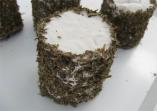Excellent news this morning about sugar beets south of the border: a federal court ruling that the US government illegally approved genetically modified sugar beets, on the grounds that they cross-pollinate easily, making it impossible for those who wish to grow non-GM beets to continue doing so.
Which begs the question about the approval of SmartStax GM corn: one might question the approval of a wind-pollinated member of the grass family in countries where the only GM labelling permitted is that of its negative: certified organic food cannot contain genetically modified ingredients.
Monsanto/Dow Chemical’s SmartStax GM corn was approved in the US and Canada in what I hope is record speed (I would hate to think this is the turnaround for all product approvals).
It took the EPA and the CFIA about a month to approve the stuff, from the time Monsanto submitted its documents on June 16 until the official registration July 20, which rather suggests they didn’t bother overmuch with doing their own messy safety checks or independent evaluation of environmental risks, preferring to accept Monsanto’s research. Is such haste normal? If it’s not, it appears to mark some new dodge on Monsanto’s part, that they have figured out how to outmaneuvre those pesky regulations.
Approval in Canada was announced the same day as in the US; I’m told it’s normally just a matter of rubber-stamping such products once they’ve been approved in the US. Canada certainly hasn’t demonstrated much interest in reining in the environmental or health risks of GM in the past: look at the trade pickle we ended up in recently with contaminated flax seed. Health Canada has a lovely flow chart that shows the steps required, officially, to assure our safety, but it’s hard to match all these steps to the approval of SmartStax. Here’s a full list of the GM products we already have on our tables here. So far, SmartStax doesn’t appear on the list.
Whether our legislators will attend to US court rulings, or somehow maintain that our winds don’t blow the same as theirs is another question. As is whether Canada will respect the very similar US court judgement that ruled GM alfalfa posed undue risks of cross-pollination to farmers who didn’t want to grow it, resulting in a nationwide ban in the States.
Meantime, GM sugar beets have been planted in Canada for the first time this year; your sugarbowl will certainly contain some GM sugar if you buy Rogers sugar. Vote with your dollars, folks.









4 Responses to GM day – hello US GM beet ban – goodbye organic corn?